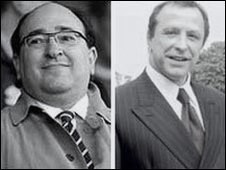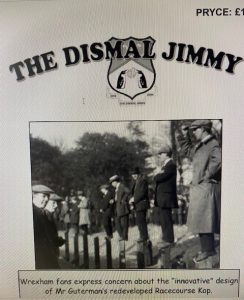Wrexham: the prequel – before the happy Hollywood ending the nightmare beginning

A second promotion to League One, and a new series of Welcome to Wrexham on Disney Plus, has once again drawn eyes to the remarkable rise of the Wrexham FC.

Back in the early 2000s two Cheshire property developers struck on the grand scheme to buy the club, sell the ground for a retail development and get the Welsh Development Agency, along with the proceeds from that sale, to fund a new stadium on the outskirts of town.
The pair were Alex Hamilton and Mark Guterman, and to compound suspicions among the supporter base and the local community, the latter had at one time been the chairman of Wrexham’s arch rivals, Chester City, an association that ended badly.
What followed was a circus, a drama.
But though a rich source of media stories – including a colourful alternative fanzine called Dismal Jimmy – provides part of the entertaining public record of Wrexham’s history, detailed evidence given by the Wrexham Supporters Trust in their submission to a parliamentary enquiry into Football Governance – Culture, Media and Sport Committee, lays out the events as they happened.
In April 2002 a solicitor turned developer called Alex Hamilton entered into an agreement with Mark Guterman — which they called the “Wrexham Project” — to profit personally from the property assets of Wrexham AFC.
Legend had it at the time that Guterman was a front for a bunch of investors from Cheshire’s wealthy golden triangle – Alderley Edge, Knutsford and Wilmslow, hatched in the captain’s room at Mere Golf and Country Club. In 2016 Guterman called me to specifically refute this and make clear it was just him and Hamilton.
What is true is that after taking ownership of Wrexham after buying it from long term owner Pryce Griffiths, through their own investment vehicle, they set about separating the Racecourse Ground, Wrexham’s stadium, from the club itself.
In 1998 Wrexham AFC had bought a 125 lease from the brewery Marston Thomas & Evershed brewery for £750,000 in order to secure their tenure at the Racecourse Ground for a peppercorn rent.
Wolverhampton and Dudley Brewery had originally inherited the freehold to the Racecourse when they took over Marston’s Brewery in 1999.
In March 2002, the new owners of Wrexham AFC started talking to the Brewery to purchase the freehold on trust, but not for the club but for a vehicle called Damens Limited, a company owned by Alex Hamilton and the club were to pay £30,000 a year as part of a long term lease agreement.
No minutes of the club recorded this, in fact meetings were rarely held at all.
The fans, deeply suspicious of the owners anyway, turned on Guterman in particular.
Matters weren’t helped when Guterman was banned from driving for six months after speeding at more than 100mph in his Aston Martin, the lease payments on which were paid for by Wrexham FC.

The protestors then turned up at their homes in leafy Cheshire, often dressed as comedy characters from the Batman film, but they also got organised, and forensic, and successfully earned the trust of investigative journalist David Conn.
By any measure things weren’t going well. Eventually it was shown quite how badly when the Inland Revenue filed a winding up petition because they hadn’t been paid.
However, Guterman and Hamilton fell out and went to court in September 2004 over the terms of their joint venture agreement (JVA), where details of the “Wrexham Project” first came to light. This agreement stated that: “The management and control of the football club is to be on an equal… basis, with the main or sole objective to realize the maximum potential gain from the property assets of the football club for the benefit of [Mr Hamilton] and [Mr Guterman].”
Hamilton attempted to run the club on his own, and at one point served notice on the club to quit its historic home, the Racecourse Ground, but by December of 2004, Wrexham entered into administration. It then fell to David Acland from Begbies Traynor to set about restructuring the business, the club suffering a points deduction and relegation to the fourth tier.
Rancorous and chaotic as Guterman and Hamilton’s brief reign was, it was the years following their fall out and departure that proved most catastrophic.
In good faith Acland eventually sold the club to a consortium of local businessmen led by Neville Dickens and Geoff Moss in 2006 for £3.3m.

By the time the flats had been built, any further stadium development or refurbishment had been made impossible, and the main ‘Kop’ terrace behind the goal, which had been derelict since the Guterman years, hemmed the stadium in still further.
Having endured a period of administration, and the formation of “Wrexham FC 2006 Ltd” the club narrowly avoided relegation to the Football Conference at the end of the 2006-07 season, but was relegated from the Football League for the first time in its 81 year history in April 2008.

It could have got even worse. While the club was up for sale the potential purchasers included a motley collection of small town local businessmen, but also including another former Chester City owner, Stephen Vaughan, who was in prison at the time for breaking a policeman’s jaw; a UKIP councillor and banned director for a vintage champagne selling scam; a man who sold self-build plots of land with no planning permission on flood plains and green belts; a banned director from a failed insurance firm; and a local small hotel owner who had been jailed for selling unlicensed hardcore porn.
The Wrexham Supporters Trust bought the club on 12 December 2011. Though stable, the club was unable to secure promotion from the National League until the acquisition by Ryan Reynolds and Rob McElhenney more than ten years later.
Fairytales have a happy ending, but they also have a prequel.
So where are they now?
In 2010 Guterman, then living in Monaco, took a seven year ban on being a company director. According to Companies House records he hasn’t been a director of a limited company in the UK since.
In 2015 he was declared bankrupt. There are few details on the London Gazette notice, and his shareholdings at the time were valued at minus £561,568.
The campaigning Wrexham supporters have never forgotten him, or Hamilton, and seem determined to keep an eye on him and look out for where he might pop up next, noting his addresses and how much they were bought for on the Land Registry.
Hamilton, who contested his misconduct charges, was also banned from serving as a director for seven years, and has been living in Paphos, Cyprus, as a semi-retired property investor and foreign currency trader, wintering in Malaysia and the Caribbean.
Then, in July this year he popped up in the High Court in London after succeeding in a claim of $700,000 against the operators of an unregulated foreign exchange futures enterprise, known as the Currency Club, which had folded in 2017.
Attempts have been made to contact both Hamilton and Guterman and requests have been made for comment.

Speaking to one of the driving forces behind the Wrexham Supporters Trust, they are clearly enjoying the revival of their club, after all the agony of those earlier years.
Other fans may resent the accolades and the Disney films and the American tour, but they brush it off.
“So this is why the ‘Wrexham bought the League’, ‘it’s not a fairytale story’ stuff doesn’t wash that strongly with me,” said one. “For two decades it’s been a nightmare and every time you go to a game you can still see the legacy of Geoff Moss’s student flats like a slap in the face, hemming the club in so that the Wrexham Lager Stand can’t be expanded.
“Getting back into the Football League to me was just undoing an injustice,” he sighed.







